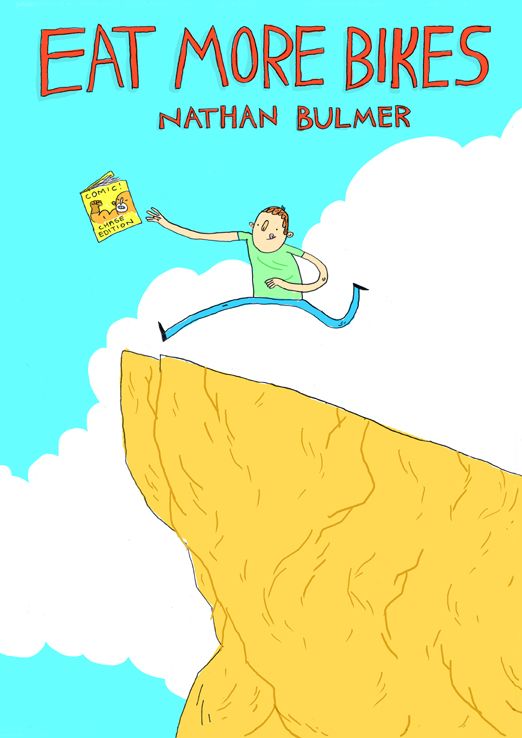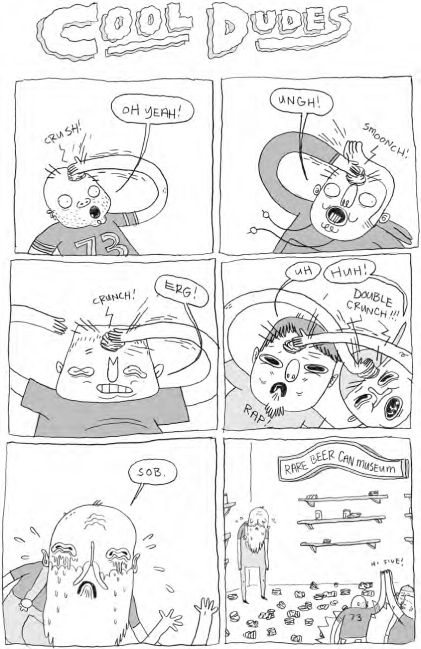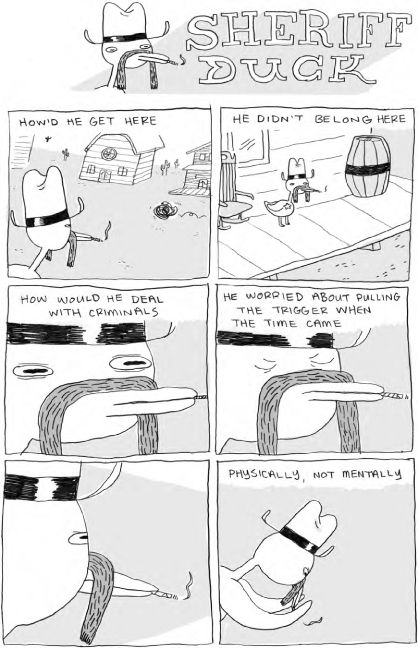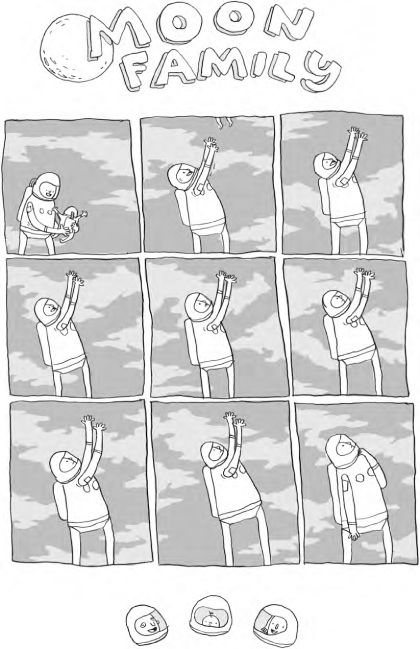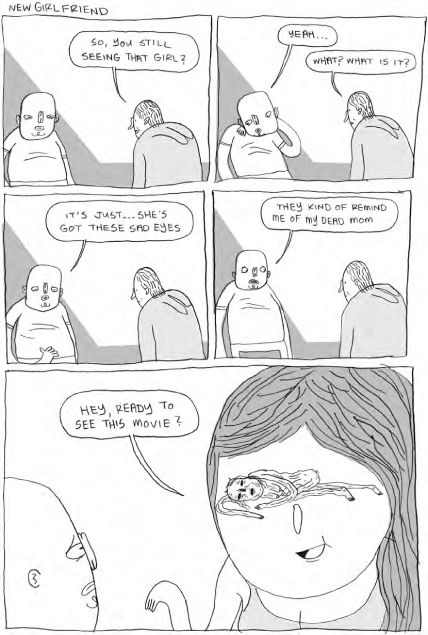If I am grateful for nothing else, it's that 2012 was the year I was introduced to the work of Nathan Bulmer, creator of the daily and often uproariously funny webcomic Eat More Bikes. That introduction is in large part due to Tucker Stone, who has been regularly featuring Bulmer's comics in his weekly column, "Comics of the Weak."
Bulmer celebrated the end of the year with the release of his new comic, naturally titled Eat More Bikes, from Koyama Press. I had the chance to chat with Bulmer about the new series, how he got into comics and the challenges of producing a daily comic.
Robot 6: Where are you from?
Nathan Bulmer: Born and raised in Seattle, then college and couple years of figuring out life in Kansas City, Missouri, and I currently call Brooklyn home. I've made a slow crawl across the United States.
How did you first get interested in comics and illustrations?
I was definitely a comics-obsessed kid. I don’t know how it started or what my first comic was. But, I clearly started young as one of the earliest drawings my parents still have of mine is a scribble of a character called Cat Man. I got caught up in the hologram-cover '90s comics insanity and had subscriptions to Wolverine and X-Men for years. But, living in Seattle, and having parents that were happy to have me reading anything, meant that I was surrounded by a lot of the Fantagraphics books, too. I probably discovered R. Crumb and Ivan Brunetti’s Schizo way earlier than I should have. I think during that time I was more interested in the way the indie/underground artists drew but still fantasized about doing superhero books myself. Because of that I always really liked the guys who blended the lines between the two. At the time I looked a lot at Sergio Aragones's Groo books and Keith Giffen when he was fooling around in that super nutty style for his Trencher, Lobo: Infanticide, and Images of Shadow Hawk books. It wasn't until I read Jim Mahfood's Generation X: Underground Special that I started getting more seriously interested in comics as a pursuit for myself though.
What are some of your influences?
Right now, I love the perfect naivete of hobo moniker graffiti, watching animation in all its forms, soul music, hip-hop music, music in general, just about every comic I pick up, studying stand-up comics and comedy writing in general, and people-watching.
In my mind, though, the greatest influence came from working with Mark Newgarden and Scott Campbell (Great Showdowns Scott Campbell not Danger Girl Scott Campbell) while in grad school. Those guys were hugely influential on my current work ethic and the way I approach my comics.
How did you get started doing Eat More Bikes and where did the title come from?
While I was getting my master's degree at SVA [the School of Visual Arts in New York City], I made up a fake slogan that was kind of meant to take the piss out of the feel-good, save-the-Earth kind of slogans. That slogan was "Eat More Bikes." I became obsessed with it but never really did anything with it, I just wrote it down a whole bunch. There are probably pages of paper floating around with "Eat More Bikes" written on it hundreds of times, The Shining-style.
After I got out of school in 2010 I wasn't getting much work, and because of that I wasn't producing anything. My good friend Anna Raff had started a daily project where she was drawing different birds and bird-related puns. I liked the idea of having to challenge yourself every day to produce something. I decided to take the daily deadline as seriously as possible and think of it as though it were an assignment from an art director. Then when it came to naming the project, I felt giving it a proper title would make it more "real." And, if I titled it Eat More Bikes I knew I better not blow it since I liked the name so much.
But, I think what most people associate Eat More Bikes with now is the four-panel comics I do. I played around with posting all sorts of different stuff that ranged from single panel gag comics to illustrated short stories. It took me a about a year to figure out that the four panel strips are what I had the most fun doing. I've been working strictly in that format (on the web) for a little over a year at this point and am still loving it.
What ultimately made you decide to pursue a career in art and attend SVA? And was the college a good experience for you?
By the time I had finished high school I had been accepted to the Kansas City Art Institute. I felt like I wasn't ready for college yet, for commitment and maturity reasons, so I took a year off from serious schooling. I worked as event security for a year while taking a couple of math and psychology courses at a community college. At the time I thought those were two other things I would like to pursue in life. I enjoyed those classes, but I didn't love them. I knew I loved making art, so the decision was made and the next year I was in Kansas City ready to go.
Fast forward a few years and I was out of school and working as a valet at a casino in Kansas City. I had a "my-life-needs-to-change" moment. So, I moved to New York to take my shot at the art world. I had always been interested in the programs and faculty at SVA so, with some encouragement from my girlfriend, (now soon to be wife,) I put together a portfolio, applied, and thankfully, got in.
I think college and grad school were completely invaluable for me. I had a few teachers and fellow students that were willing to kick my ass and not let me off the hook, which I needed. In both places, KCAI and SVA, I felt like I came out producing work far superior to what I had gone in making and would probably not have done so on my own. It was during my two years at SVA that I started making comics and getting serious about the medium.
What do you think it is about the four-panel format that makes it so enjoyable for you? Is there something perfect about that particular setup and delivery that works really well for joke-telling?
The constraints and the rhythm options four panels gives you is incredible. I feel like it lends itself better to joke telling than a three panel strip. It gives you a chance to put a "breath" panel in there without it taking up too much space. You can get a real joke telling rhythm going, you can go beat, beat, beat, punchline or beat, beat, breath, punchline or beat, beat, punchline, breath, etc., etc. (I love all the possibilities!) I even like playing with punchline, breath, breath, breath (though in a way those breaths are beats in that case) because I feel like those three last panels make for the perfect follow up rhythm that can drive an image home better than just two panels could.
There's also the challenge of telling a complete story in that short of a space. It's short enough that it forces you to simplify everything, to focus on what the most important things are to clearly convey your idea. Which also comes in handy for when I'm writing longer comics because I feel like it helps me identify and trim some of the fat.
Was it difficult then, when working on the somewhat lengthier material in the Eat More Bikes comic to get out of that four panel mindset?
Yes and no. I keep a huge running list of ideas on my phone. And some ideas just don't work as four-panel jokes. I'll try to write them in different ways, but some jokes just require a different rhythm, a longer set-up, or just a better panel structure that the four panel format just can't offer. So, some of the material was already written and ready to go. And, I was happy to get the chance to break out of the four panel grid so I could show people that I wasn't a one trick pony in a sense. But, there were definitely some very lengthy 'stare at the ceiling and freak out about doing longer comics' sessions that took place during the creation of the book.
I ended up studying a lot of other peoples comics, just looking at the panel layout and the way they paced longer narratives. I had done longer work before but it had been awhile and the wheels definitely needed some greasing.
What comics did you study for the first issue? Were there specific sequences you can cite as examples you referenced?
I looked at a lot of Michael Deforge, Ernie Bushmiller, the Hernandez brothers, and a few others. All of them are masters in multiple areas. Especially in pacing, layout, and text management. So, I tried to soak it all in and focus on what they did to not overload the readers and the ease with which you can read their work.
There aren't any sequences in the book that I could point to and say that I lifted from anywhere. Probably the closest I got was experimenting with a grid, with no spaces in between the images, for a couple pages like in some of Deforge's work. But I ended up not going that route because I felt like the space between panels allows for better timing in my comics.
So do you plan to do more issues of Eat More Bikes? If so, how often do you hope to get issues out? Will it be a yearly series or quarterly? Neither?
I would definitely like to do more issues of it. If I am realistic with myself I think a yearly schedule is what I could hold to, maybe twice a year depending on how life intervenes. Working a 9-to-5, maintaining a healthy relationship with my fiance, and doing the daily comic alone take up a lot of time. So, I think if I could spread out the work over the course of a year it would make for better comics and better mental health.
There's a real edge of black humor that runs through your comics, which I appreciate. But I was wondering how conscious you are of that and whether you attempt to cultivate it or not. Do you self-edit yourself at all? Are there places you won't go or subjects you won't delve into?
I'm aware of it but I don't think I try to cultivate it necessarily. When I was young I thought about my mortality, a lot, to the point that I would lay in bed, start crying, and get up to tell my mom about me not wanting to die. So, death, or at least the idea of death, has always been something that my brain has fixated on. That fact has made me a little bit of a worry wart, but humor has been and probably always will be a huge way for me to deal with serious issues I face. And because of that I think it comes through in my comics. But, when I sit down I don't actively try to think of morbid or bleak things I just think they are so intertwined with my sense of humor at this point that it tends to come out like that.
There are probably a few topics I won't touch, but more-so there are ways I won't handle a subject. Like, I have no intention of being the next Johnny Ryan. His comics are great, but they push the limits in a way that I'm not really interested in with my comics. So, self-editing does happen. There are a few comics I've done that I never posted because they hit the wrong note. Where they sounded funny in my head, but once I put them on paper they just came off in a way that I felt wasn't contributing anything and could come off as more hurtful than funny. I think a lot of it is I try to stay away from jokes that come at the expense of a group or type of people but most everything else is fair game.
So apart from the daily Eat More Bikes, what are you working on now? What are your plans for 2013?
Boy, besides the daily? That cuts out a few hundred comics from my plans. ... But, I am in the process of editing a humor anthology along with Lauren Barnett for Hic & Hoc that I'm very excited about. We have an insanely great line-up of contributors and the book should be making its debut at TCAF in May. I'd like to work on getting a thick collection of the dailies out into the world. I have a billion ideas swirling around in my head for comics and other projects to do this year, but nothing too formal yet. I think the main hope though is to just continue to push myself and have fun making comics. Comics are the best.


